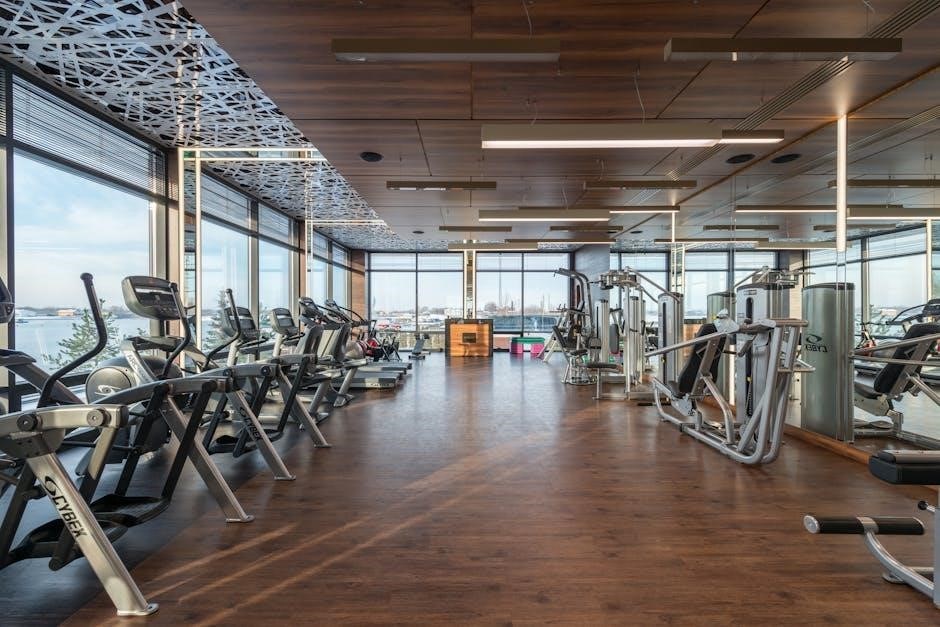Functional training focuses on exercises that enhance daily activities and sports performance, improving strength, mobility, and balance. It uses bodyweight, resistance bands, and equipment for versatile, full-body workouts suitable for all fitness levels.
What is Functional Training?
Functional training is a systematic approach to exercises designed to enhance mobility, strength, and coordination by mimicking real-life movements. It focuses on improving daily activities and specific performance goals through targeted muscle engagement. Unlike traditional workouts, functional training emphasizes natural movement patterns, ensuring that exercises translate to practical, everyday tasks. This approach is widely used by athletes, fitness enthusiasts, and individuals seeking to improve their overall physical efficiency. By addressing multiple muscle groups simultaneously, functional training promotes better balance, posture, and injury prevention. It is a versatile and adaptive method that can be tailored to various fitness levels and objectives, making it highly effective for both sports and general well-being.
Benefits of Functional Training for Daily Activities
Functional training significantly enhances daily life by improving strength, balance, and coordination. It mimics real-life movements, making tasks like carrying groceries, climbing stairs, or playing with children easier. This type of training boosts core stability, essential for maintaining good posture and reducing back pain. Enhanced mobility and flexibility also reduce the risk of injuries during everyday activities. Additionally, functional exercises improve proprioception, helping individuals navigate challenging environments with confidence. By focusing on practical movement patterns, functional training ensures that the body is better equipped to handle the demands of daily life, promoting overall physical efficiency and independence. This makes it an ideal choice for individuals seeking to improve their quality of life through targeted, effective workouts.
Importance of Functional Training in Sports Performance
Importance of Functional Training in Sports Performance
Functional training is a cornerstone of athletic preparation, enhancing sports performance by improving strength, power, and speed. It focuses on movement patterns that directly translate to specific sports, ensuring athletes can perform at peak levels. Exercises like pull-ups, resistance band drills, and dynamic warm-ups build functional strength, essential for explosive movements and endurance. Functional training also boosts mobility and flexibility, reducing injury risks and improving overall agility. By targeting muscle groups in a way that mimics game scenarios, functional training helps athletes achieve better coordination and reaction times. This makes it a vital component of any sports conditioning program, driving success in competitive environments.

Defining Functional Training Exercises
Functional training exercises are movements designed to enhance coordination, balance, and strength by mimicking real-life activities. They improve mobility and prepare the body for specific tasks.
Bodyweight Exercises for Functional Strength
Bodyweight exercises, such as pull-ups, push-ups, squats, and lunges, are foundational for functional strength. Pull-ups target the upper body, improving grip, shoulder stability, and overall posture. Variations like wide-grip or neutral-grip pull-ups can focus on different muscle groups. Push-ups enhance chest, shoulder, and tricep strength, while squats and lunges build leg strength and balance. Planks and glute bridges improve core stability and hip function. These exercises mimic real-life movements, making them ideal for enhancing daily functionality and sports performance. They require no equipment, making them accessible for anyone looking to build strength and mobility. Regular practice can lead to noticeable improvements in overall fitness and athleticism.
Resistance Band Exercises for Mobility and Flexibility
Resistance bands are versatile tools for improving mobility and flexibility while strengthening muscles. Exercises like banded squats, chest presses, and leg curls target specific muscle groups. The bands provide continuous tension, enhancing range of motion and joint mobility. For example, banded shoulder rotations and hip flexor stretches can increase flexibility and reduce stiffness. These exercises are lightweight, portable, and suitable for all fitness levels. Incorporating resistance bands into routines helps improve functional strength and movement efficiency, making daily tasks and athletic performance easier. They are ideal for warm-ups, cool-downs, or as standalone workouts to enhance overall flexibility and mobility.
Equipment-Based Functional Training Exercises
Equipment-based functional training leverages tools like barbells, dumbbells, TRX systems, and cable machines to enhance strength and mobility. Pull-ups, overhead presses, and rows target multiple muscle groups, improving functional strength. Cable crossover machines allow for exercises across various planes of motion, boosting muscle coordination. Dumbbell exercises, such as lunges and chest presses, mimic real-life movements, enhancing daily activity performance. Barbell exercises like squats and deadlifts build foundational strength. TRX systems provide suspension training for core stability and flexibility. These equipment-based exercises are versatile, scalable, and effective for improving overall fitness and sports performance, making them essential for functional training programs.

Functional Training Workout Routines
Functional training routines combine dynamic warm-ups, circuit workouts, and conditioning drills to enhance strength, speed, and endurance. Programs like HIIT and full-body exercises improve overall fitness efficiently.
Dynamic Warm-Up Exercises for Functional Training
Dynamic warm-ups are essential for preparing the body for functional training. They involve active movements like leg swings, arm circles, and torso twists to boost flexibility and circulation. High knees, butt kicks, and lateral shuffles improve mobility and coordination. Incorporating light cardio, such as jumping jacks or jogging in place, elevates heart rate and readiness. Functional dynamic stretches, like lunges with twists or plank variations, target multiple muscle groups and enhance range of motion. These exercises are vital for preventing injuries and ensuring optimal performance during workouts. A well-structured warm-up routine sets the foundation for effective functional training sessions.
Power, Speed, and Strength Drills
Power, speed, and strength drills are core components of functional training, designed to enhance athletic performance and real-world functionality. Box jumps and medicine ball throws are excellent for building explosive power, while sled pushes and resistance band sprints improve speed and acceleration. Strength-focused exercises like pull-up variations, kettlebell swings, and weighted squats target muscle development and functional capacity. These drills are tailored to improve coordination, reaction time, and overall physical resilience. Incorporating progressive overload and proper form ensures continuous improvement and reduces injury risk. By combining these elements, individuals can achieve a balanced blend of power, speed, and strength for both sports and daily activities.
Conditioning Drills for Overall Fitness
Conditioning drills are essential for enhancing cardiovascular health, muscular endurance, and overall physical resilience. Exercises like burpees, jump squats, and mountain climbers are excellent for improving stamina and coordination. Circuit workouts, which involve performing a series of exercises back-to-back with minimal rest, are a popular way to boost fitness levels. High-intensity interval training (HIIT) is also widely used, combining short bursts of intense effort with brief recovery periods. These drills are versatile, requiring minimal equipment, and can be tailored to suit different fitness levels. By incorporating conditioning drills into your routine, you can improve endurance, burn calories, and achieve a well-rounded physical fitness.

RCMP Functional Strength and Conditioning Program
The RCMP Functional Strength and Conditioning Program is a sequential fitness training system with four levels, designed to enhance overall functional strength and mobility progressively.
Level 3 Program Overview
The RCMP Functional Strength and Conditioning Program’s Level 3 is an advanced phase designed to enhance functional strength, mobility, and overall fitness. It focuses on dynamic exercises and circuit workouts, incorporating resistance training and bodyweight movements to improve power, speed, and endurance. The program emphasizes progressive overload to challenge participants and promote continuous improvement. Tailored for individuals with a foundational fitness level, Level 3 includes structured workouts that target multiple muscle groups simultaneously, ensuring a holistic approach to physical preparedness. This phase is particularly beneficial for improving sports performance and everyday functionality while reducing the risk of injury through balanced and coordinated movements.
Circuit Workouts for Functional Fitness
Circuit workouts are a cornerstone of functional fitness, offering a dynamic and efficient way to improve strength, endurance, and mobility. These structured sessions involve performing a sequence of exercises back-to-back with minimal rest, targeting multiple muscle groups and planes of movement. Each circuit is designed to simulate real-world challenges, enhancing coordination and functional strength. By integrating bodyweight exercises, resistance bands, and equipment-based movements, circuits provide versatility for various fitness levels. They are particularly effective for boosting cardiovascular health and muscular endurance while preparing the body for the demands of daily life and sports. Circuits are time-efficient and engaging, making them a popular choice for functional training programs.

Functional Training Plans and Programs
Functional training plans are structured programs designed to enhance strength, mobility, and overall fitness. They often include HIIT, circuit workouts, and full-body exercises tailored to individual goals.
6-Week High-Intensity Interval Training (HIIT) Program
This 6-week HIIT program combines functional exercises with high-intensity intervals to boost strength and endurance. Each week focuses on different muscle groups, incorporating bodyweight exercises, resistance bands, and equipment-based movements. The program includes warm-ups, dynamic stretches, and conditioning drills. Workouts are structured to improve cardiovascular fitness, increase muscle tone, and enhance functional strength. Participants can expect varied routines, ensuring comprehensive fitness development. The program is designed for all fitness levels, with modifications for beginners and challenges for advanced trainees. Consistency and proper form are emphasized to achieve optimal results.
5-Day Full Body Workout Schedule
The 5-day full-body workout schedule is designed to maximize efficiency and results. Each day targets different muscle groups while incorporating functional exercises for overall fitness. Day 1 focuses on strength training with bodyweight exercises like pull-ups and squats. Day 2 emphasizes mobility and flexibility using resistance bands. Days 3 and 4 combine power and speed drills with conditioning exercises. Day 5 is a dynamic circuit workout, blending functional movements for a full-body challenge. Rest and recovery are built into the schedule to optimize performance. This structured plan ensures balanced development, improving both strength and functional ability. It’s suitable for all fitness levels, with scalable intensity.
Functional training is a versatile and effective approach to enhancing strength, mobility, and overall fitness through practical exercises, benefiting both daily life and sports performance.
Final Thoughts on Functional Training
Functional training is a dynamic and adaptable approach to fitness, offering exercises that mirror real-life movements and enhance overall physical performance. By focusing on functional strength, mobility, and flexibility, individuals can improve their ability to perform daily tasks and excel in sports. The versatility of functional training allows it to cater to diverse fitness levels, from beginners to athletes, ensuring everyone can benefit. With structured programs like the RCMP Functional Strength and Conditioning Program and HIIT workouts, achieving a balanced and strong physique is achievable. Consistency and proper form are key to maximizing results, making functional training a sustainable and effective long-term fitness solution.

